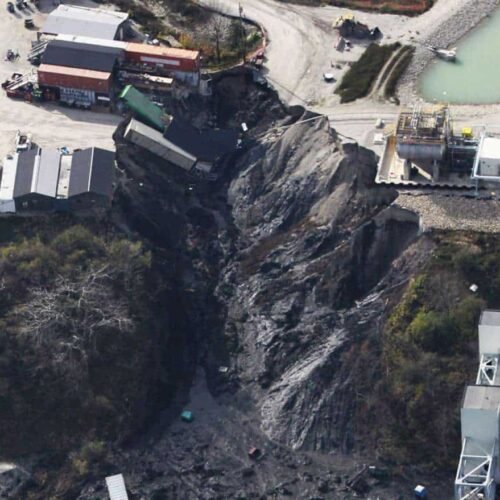Introduction

A cascade of coal ash, dirt and mud fell into the shore of Lake Michigan yesterday after a large section of bluff collapsed beside the We Energies Oak Creek Power Plant in Milwaukee County, Wisconsin. It is unknown how much coal ash fell from the pile, but the spill left behind a debris field about 120 yards long, the Milwaukee-Wisconsin Journal Sentinel reports.
“Based on our land use records it is probable that some of the material that washed into the lake is coal ash,” We Energies spokesman Barry McNulty told the Journal Sentinel. “We believe that was something that was used to fill the ravine area in that site during the 1950s. That’s a practice that was discontinued several decades ago.”
As iWatch News has previously reported, coal ash is the leftover residue from burning coal that is known to contain neurotoxins like lead and mercury and the carcinogens such as arsenic. In a series of investigations, iWatch News has examined the lack of federal oversight of the waste and its affects on communities near coal ash dump sites.
House Republicans championed legislation in mid-October that would strip the Environmental Protection Agency of its ability to regulate coal ash and give regulatory authority to the states — a move that would shift authority away from the EPA and reduce federal regulations that Republicans say are burdensome.The Obama administration has voiced opposition to the House legislation, calling it “insufficient to address the risks associated with coal ash disposal and management.”
The Lake Michigan spill is similar to a dam break at a Tennessee Valley Authority power plant in 2008, where 1.1 billion gallons of coal slurry was dumped across hundred of acres — killing nearby wildlife and damaging homes.
The cause of the Wisconsin bluff collapse is still unknown. None of the 100 or so nearby workers were injured in the spill, and clean-up has already begun. U.S. Coast Guard Lt. j.g. Brian Dykens called it a “freak accident.”
Read more in Environment
Environment
Limits on mercury and soot could save billions, improve public health, studies say
Proposed new emissions regulations are under attack from GOP and industry
Environment
TransCanada lobbying: Company ramps up pressure on lawmakers
Nebraska lawmakers could stall massive pipeline project



Join the conversation
Show Comments